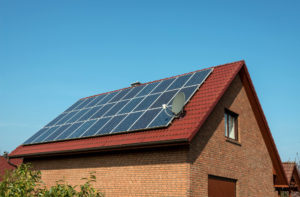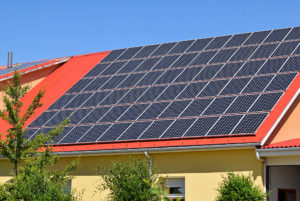Solar energy is no longer just a buzzword; it’s a practical and sustainable solution for meeting our electricity needs. With climate change concerns and the rising cost of electricity, many homeowners and businesses are turning to renewable energy sources like solar power to reduce their carbon footprint and save money. In this article, we’ll delve into the world of “Behind the Meter” (BTM) solar systems and why they are becoming increasingly popular in renewable energy.
Contents
- 1 Key Takeaways
- 2 Behind the Meter Solar Explained
- 3 Behind the Meter vs. Front of the Meter
- 4 The Role of BTM Solar in Renewable Energy
- 5 Energy Systems with BTM Solar
- 6 Challenges and Solutions
- 7 Is BTM Solar Right for You?
- 8 Case Study: Embracing Behind-the-Meter Solar for Energy Independence
- 9 Expert Insights From Our Solar Panel Installers About Unveiling the Power of Behind-the-Meter Solar
- 10 Experience Solar Excellence with Us!
- 11 Conclusion
Key Takeaways
- Behind the Meter (BTM) solar systems offer energy independence, cost savings, and environmental benefits by generating electricity right where needed, reducing reliance on the grid, and lowering carbon emissions.
- BTM solar differs from Front of the Meter (FTM) systems, providing greater control, ownership, and scalability for individual users, while FTM systems serve larger utility-scale needs.
- Assess your energy requirements, consult with professionals, and explore financing options to determine if BTM Solar is the right choice for your home or business, paving the way for a sustainable and financially savvy future.
Behind the Meter Solar Explained
Key Components of BTM Solar Systems
Behind-the-meter (BTM) solar systems are designed to generate electricity at the point of consumption, typically right where it’s needed most—your home or business. These systems consist of several key components:
Solar Panels
Solar panels, or photovoltaic (PV) panels, are the heart of any solar energy system. These panels convert sunlight into electricity through the photovoltaic effect. The solar panels are usually mounted on rooftops or other suitable areas where they can capture sunlight effectively.
Inverters
Inverters play a crucial role in BTM solar systems by converting the solar panels’ direct current (DC) electricity into alternating current (AC) electricity, which is compatible with your electrical appliances and the power grid.
Energy Storage
Battery storage is an essential component of BTM solar systems. It allows you to store excess energy generated during the day for use at night or during cloudy days. This aspect of BTM systems enhances energy independence and reliability.
How Behind the Meter Solar Works
Behind the Meter, solar systems harness the sun’s power to generate electricity on-site. Here’s how it happens:
- Solar panels capture sunlight and convert it into electricity.
- The generated electricity is used immediately to power your home or business or stored in batteries for later use.
- Any excess energy you don’t use is often fed back into the grid, depending on your location and the net metering policies in place.
Advantages of BTM Solar
Energy Independence
One of the most significant advantages of BTM solar systems is the level of energy independence they offer. You become less reliant on the power grid by generating your electricity locally. This can be especially beneficial during grid outages or emergencies, as you’ll have a reliable source of electricity.
Cost Savings
Installing BTM solar panels can lead to substantial cost savings over time. You’ll generate electricity, reducing your dependence on electricity from the grid. Additionally, some regions offer incentives, tax credits, and rebates for adopting renewable energy technologies.
Environmental Benefits
Switching to BTM solar power significantly reduces your carbon footprint. By generating electricity from the sun, you decrease the need to burn fossil fuels, lowering greenhouse gas emissions. This environmentally friendly choice contributes to a healthier planet.

Behind the Meter vs. Front of the Meter
To better understand the benefits of BTM solar, it’s essential to differentiate it from “Front of the Meter” (FTM) solar systems.
Distinguishing BTM Solar from FTM
BTM solar systems are located on-site, where electricity is consumed, while FTM solar systems are utility-scale installations that generate electricity for the broader grid. FTM systems are often massive solar farms, whereas BTM systems can be installed on rooftops or in smaller spaces.
Pros and Cons of BTM vs. FTM Solar
Utility Integration
BTM solar systems provide greater control and independence for homeowners and businesses. On the other hand, FTM systems rely on utility companies and may not offer the same level of independence.
System Ownership
With BTM Solar, you own and maintain the system, giving you control over its performance and maintenance. FTM systems are typically owned and operated by utilities or third-party developers.
Scalability
BTM solar systems can be scaled to meet your specific energy needs, making them suitable for various applications. FTM systems are designed for utility-scale electricity generation and may not be as flexible for individual users.
The Role of BTM Solar in Renewable Energy
Contributing to the Growth of Renewable Energy
BTM solar systems play a vital role in the transition to renewable energy. As more homes and businesses adopt BTM solar, the grid’s electricity demand decreases, leading to a reduced reliance on fossil fuels and a cleaner energy mix.
Reducing Dependency on Utility Grids
By generating electricity locally, BTM solar systems reduce the strain on the power grid during peak hours. This can lead to fewer blackouts and a more stable and resilient energy infrastructure.
Maximizing the Use of Solar Resources
BTM solar systems make the most of available solar resources, especially in areas with abundant sunlight. This means you can generate a significant portion of your electricity needs from a clean and renewable source.
Energy Systems with BTM Solar
Residential BTM Solar Systems
Residential BTM solar systems are an excellent choice for homeowners looking to reduce their electricity bills and environmental impact. These systems are typically installed on rooftops and provide electricity for daily household needs.
Commercial and Industrial BTM Solar Applications
Businesses can also benefit from BTM solar. Large commercial and industrial facilities can install BTM solar systems to power their operations, reduce operating costs, and demonstrate a commitment to sustainability.

Challenges and Solutions
Challenges in BTM Solar Adoption
While BTM solar offers numerous advantages, there are challenges to consider. These challenges include the initial installation costs, regulatory hurdles, and the need for proper maintenance.
Mitigating Challenges: Best Practices
We’ll discuss best practices for overcoming these challenges and ensuring the successful implementation of BTM solar systems.
Regulatory and Policy Considerations
Understanding the local regulations and policies related to BTM solar is crucial. We’ll provide insights into how to navigate these aspects effectively.
Is BTM Solar Right for You?
Assessing Your Energy Needs
Determining whether BTM Solar is a good fit for your home or business starts with assessing your energy requirements, budget, and location.
Consultation and Installation
We’ll explain the process of consulting with solar professionals and installing BTM solar systems.
Financing Options for BTM Solar
Explore the various financing options available for BTM solar, including loans, leases, and incentives.
Case Study: Embracing Behind-the-Meter Solar for Energy Independence
Background
At Solar Panels Network USA, we strive to empower our clients with sustainable energy solutions that offer long-term benefits. This case study illustrates our successful implementation of a Behind-the-Meter (BTM) solar system for a residential client aiming to achieve energy independence and reduce their carbon footprint.
Project Overview
Our client, a homeowner concerned about rising electricity costs and environmental impact, approached us to explore the feasibility of installing a BTM solar system. They were particularly interested in achieving energy independence and minimizing their reliance on the grid.
Implementation
Initial Assessment
We conducted a comprehensive energy audit to evaluate the client’s current electricity usage and peak demand. This involved analyzing their electricity bills, identifying high-consumption appliances, and assessing the potential for solar energy generation based on their roof orientation and available space.
System Design
Based on the audit, we designed a customized BTM solar system tailored to the client’s energy needs. The system included high-efficiency solar panels, inverters, and a battery storage solution to ensure a steady power supply during non-sunny periods. The design also factored in future scalability, allowing the client to expand the system if their energy needs increased.
Installation Process
- Site Assessment: We determined the optimal placement for solar panels to maximize sunlight exposure and minimize shading.
- Panel Installation: Our team installed the solar panels on the roof, ensuring they were securely mounted and oriented for optimal performance.
- Inverter and Battery Setup: We installed high-efficiency inverters to convert the DC power generated by the panels into AC power. The battery storage system was integrated to store excess energy for use during nighttime or cloudy days.
- Grid Connection: The system was connected to the grid to allow for net metering, enabling the client to feed excess energy back to the grid and receive credits on their electricity bill.
Results
The BTM solar system provided the client with significant energy independence, reducing their reliance on the grid and lowering their electricity bills. The integration of battery storage ensured a continuous power supply, even during grid outages. Additionally, the client reported a substantial reduction in their carbon footprint, contributing to their sustainability goals.
Summary
By implementing a Behind-the-Meter solar system, Solar Panels Network USA demonstrated the potential for homeowners to achieve energy independence and substantial cost savings. The project highlighted the importance of customized system design and the benefits of integrating battery storage for enhanced reliability. This case study underscores our commitment to promoting renewable energy solutions that empower individuals and contribute to a sustainable future.
Expert Insights From Our Solar Panel Installers About Unveiling the Power of Behind-the-Meter Solar
Behind-the-Meter solar systems offer unparalleled energy independence, allowing homeowners to generate their own electricity and reduce reliance on the grid. This not only provides cost savings but also ensures a more resilient energy supply during outages.
Lead Solar Installer
The ability to store excess energy with battery storage systems in BTM solar setups is a game-changer. It ensures that you have a continuous power supply even during cloudy days or at night, maximizing the efficiency and reliability of your solar investment.
Solar Energy Consultant
BTM solar systems are scalable and customizable to meet specific energy needs, making them ideal for both residential and commercial applications. They provide greater control over energy production and consumption, leading to significant long-term savings.
Senior Solar Technician
Experience Solar Excellence with Us!
Trust in Solar Panels Network USA, where our seasoned experts deliver top-quality solar solutions for homes and businesses nationwide. With a legacy of countless successful installations and a commitment to sustainable energy, we’re your reliable partner in the solar journey. Ready for a brighter, eco-friendly future? Call us now at (855) 427-0058 and harness the power of the sun!
Conclusion
Behind the Meter (BTM), solar systems are a game-changer in renewable energy. These systems empower individuals and businesses to generate electricity, reduce their carbon footprint, and save money. By understanding how BTM solar works, differentiating it from Front of the Meter (FTM) systems, and considering the advantages and challenges, you can make an informed decision about adopting this sustainable technology. Embrace the future of renewable energy and take the first step toward energy independence with BTM Solar.
By installing BTM solar panels and battery storage, you’ll provide energy for your own needs and contribute to a greener and more sustainable future for all. Say goodbye to excessive electricity bills and hello to clean, locally generated power. Switch to BTM solar and join the growing community of environmentally conscious individuals and businesses who positively impact our planet while enjoying substantial cost savings.
About the Author
Solar Panels Network USA stands at the forefront of solar energy solutions, driven by a team of seasoned solar engineers and energy consultants. With over decades of experience in delivering high-quality solar installations and maintenance, we are committed to promoting sustainable energy through customer-centric, tailored solutions. Our articles reflect this commitment, crafted collaboratively by experts to provide accurate, up-to-date insights into solar technology, ensuring our readers are well-informed and empowered in their solar energy decisions.

